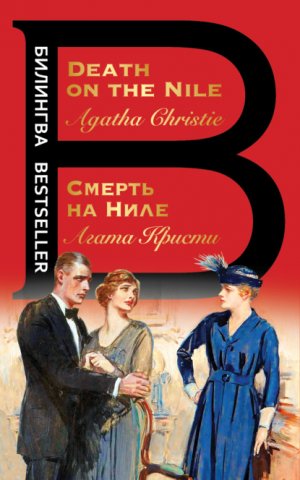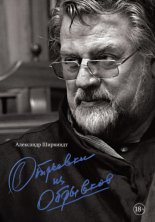—мерть на Ќиле / Death on the Nile ристи јгата

СI am so sorry, Signor Richetti. You see my name was Ridgeway before I married, and I havenТt been married very long, and soЕТ
She paused, her face dimpled with smiles, inviting him to smile upon a young brideТs faux pas.
But Richetti was obviously Сnot amusedТ. Queen Victoria at her most disapproving could not have looked more grim.
СNames should be read carefully. It is inexcusable to be careless in these matters.Т
Linnet bit her lip and her colour rose. She was not accustomed to have her apologies received in this fashion. She turned away and, rejoining Simon, said angrily,
СThese Italians are really insupportable.Т
СNever mind, darling; letТs go and look at that big ivory crocodile you liked.Т
They went ashore together.
Poirot, watching them walk up the landing stage, heard a sharp indrawn breath. He turned to see Jacqueline de Bellefort at his side. Her hands were clenched on the rail. The expression on her face as she turned it towards him quite startled him. It was no longer gay or malicious. She looked devoured by some inner consuming fire.
СThey donТt care any more.Т The words came low and fast. СTheyТve got beyond me. I canТt reach themЕ They donТt mind if IТm here or notЕ I canТt Ц I canТt hurt them any moreЕТ
er hands on the rail trembled.
СMademoiselle-Т
She broke in: СOh, itТs too late now Ц too late for warningsЕ You were right. I ought not to have come. Not on this journey. What did you call it? A journey of the soul? I canТt go back Ц IТve got to go on. And IТm going on. They shanТt be happy together Ц they shanТt. IТd kill him soonerЕТ
She turned abruptly away. Poirot, staring after her, felt a hand on his shoulder.
СYour girl friend seems a trifle upset, Monsieur Poirot.Т
Poirot turned. He stared in surprise, seeing an old acquaintance.
СColonel Race.Т
The tall bronzed man smiled.
СBit of a surprise, eh?Т
Hercule Poirot had come across Colonel Race a year previously in London. They had been fellow guests at a very strange dinner party Ц a dinner party that had ended in death for that strange man, their host.
Poirot knew that Race was a man of unadvertised goings and comings. He was usually to be found in one of the outposts of Empire where trouble was brewing.
СSo you are here at Wadi Halfa,Т Poirot marked thoughtfully.
СI am here on this boat.Т
СYou mean?Т
СThat I am making the return journey with you to Shellal.Т
Hercule PoirotТs eyebrows rose.
СThat is very interesting. Shall we, perhaps, have a little drink?Т
They went into the observation saloon, now quite empty. Poirot ordered a whisky for the Colonel and a double orangeade full of sugar for himself.
СSo you make the return journey with us,Т said Poirot as he sipped. СYou would go faster, would you not, on the Government steamer, which travels by night as well as day?Т
Colonel RaceТs face creased appreciatively.
СYouТre right on the spot as usual, Monsieur Poirot,Т he said pleasantly.
СIt is, then, the passengers?Т
СOne of the passengers.Т
СNow which one, I wonder?Т Hercule Poirot asked of the ornate ceiling.
СUnfortunately I donТt know myself,Т said Race ruefully.
Poirot looked interested. Race said:
СThereТs no need to be mysterious to you. WeТve had a good deal of trouble out here Ц one way and another. It isnТt the people who ostensibly lead the rioters that weТre after. ItТs the men who very cleverly put the match to the gunpowder. There were three of them. OneТs dead. OneТs in prison. I want the third man Ц a man with five or six cold-blooded murders to his credit. HeТs one of the cleverest paid agitators that ever existedЕ HeТs on this boat. I know that from a passage in a letter that passed through our hands. Decoded it said: УX will be on the Karnak trip February seventh to thirteenth.Ф It didnТt say under what name X would be passing.Т
СHave you any description of him?Т
СNo. American, Irish, and French descent. That doesnТt help us much. Have you got any ideas?Т
СAn idea Ц it is all very well,Т said Poirot meditatively.
Such was the understanding between them that Race pressed him no further. He knew Hercule Poirot did not ever speak unless he was sure.
Poirot rubbed his nose and said unhappily:
СThere passes itself something on this boat that causes me much inquietude.Т
Race looked at him inquiringly.
СFigure to yourself,Т said Poirot, Сa person A who has grievously wronged a person B. The person B desires the revenge. The person B makes the threats.Т
СA and B being both on this boat?Т
Poirot nodded.
СPrecisely.Т
СAnd B, I gather, being a woman?Т
СExactly.Т
Race lit a cigarette.
СI shouldnТt worry. People who go about talking of what they are going to do donТt usually do it.Т
СAnd particularly is that the case with les femmes, you would say!
СYes, that is true.Т
But he still did not look happy.
СAnything else?Т asked Race.
СYes, there is something. Yesterday the person A had a very near escape from death. The kind of death that might very conveniently be called an accident.Т
СEngineered by B?Т
СNo, that is just the point. B could have had nothing to do with it.Т
СThen it was an accident.Т
СI suppose so Ц but I do not like such accidents.Т
СYouТre quite sure B could have had no hand in it?Т
СAbsolutely.Т
СOh, well, coincidences do happen. Who is A, by the way? A particularly disagreeable person?Т
СOn the contrary. A is a charming, rich, and beautiful young lady.Т
Race grinned.
СSounds quite like a novelette.Т
СPeut-tre. But I tell you, I am not happy, my friend. If I am right, and after all I am constantly in the habit of being rightТ-Race smiled into his moustache at this typical utterance-Сthen there is matter for grave inquietude. And now, you come to add yet another complication. You tell me that there is a man on the Karnak who kills.Т
СHe doesnТt usually kill charming young ladies.Т
Poirot shook his head in a dissatisfied manner.
СI am afraid, my friend,Т he said. СI am afraidЕ Today, I advised this lady, Madame Doyle, to go with her husband to Khartoum, not to return on this boat. But they would not agree. I pray to Heaven that we may arrive at Shellal without catastrophe.Т
СArenТt you taking rather a gloomy view?Т
Poirot shook his head.
СI am afraid,Т he saidsimply. СYes, I, Hercule Poirot, am afraidЕТ
Chapter 11
Cornelia Robson stood inside the temple of Abu Simbel. It was the evening of the following day Ц a hot still evening. The Karnak was anchored once more at Abu Simbel to permit a second visit to be made to the temple, this time by artificial light. The difference this made was considerable, and Cornelia commented wonderingly on the fact to Mr Ferguson, who was standing by her side.
СWhy, you see it ever so much better now!Т she exclaimed. СAll those enemies having their heads cut off by the King Ц they just stand right out. ThatТs a cute kind of castle there that I never noticed before. I wish Dr Bessner was here, heТd tell me what it was.Т
СHow you can stand that old fool beats me,Т said Ferguson gloomily.
СWhy, heТs just one of the kindest men IТve ever met.Т
СPompous old bore.Т
СI donТt think you ought to speak that way.Т
The young man gripped her suddenly by the arm. They were just emerging from the temple into the moonlight.
СWhy do you stick being bored by fat old men Ц and bullied and snubbed by a vicious old harridan?Т
СWhy, Mr Ferguson!Т
СHavenТt you got any spirit? DonТt you know youТre just as good as she is?Т
СBut IТm not!Т Cornelia spoke with honest conviction.
СYouТre not as rich; thatТs all you mean.Т
СNo, it isnТt. Cousin MarieТs very cultured, and-Т
СCultured!Т The young man let go of her arm as suddenly as he had taken it. СThat word makes me sick.Т
Cornelia looked at him in alarm.
СShe doesnТt like you talking to me, does she?Т said the young man.
Cornelia blushed and looked embarrassed.
СWhy? Because she thinks IТm not her social equal! Pah! DoesnТt that make you see red?Т
Cornelia faltered out:
СI wish you wouldnТt get so mad about things.Т
СDonТt you realize Ц and you an American Ц that everyone is born free and equal?Т
СTheyТre not,Т said Cornelia with calm certainty.
СMy good girl, itТs part of your constitution!Т
СCousin Marie says politicians arenТt gentlemen,Т said Cornelia. СAnd of course people arenТt equal. It doesnТt make sense. I know IТm kind of homely looking, and I used to feel mortified about it sometimes, but IТve got over that. IТd like to have been born elegant and beautiful like Mrs Doyle, but I wasnТt, so I guess itТs no use worrying.Т
СMrs Doyle!Т exclaimed Ferguson with deep contempt. СSheТs the sort of woman who ought to be shot as an example.Т
Cornelia looked at him anxiously.
СI believe itТs your digestion,Т she said kindly. СIТve got a special kind of pepsin that Cousin Marie tried once. Would you like to try it?Т
Mr Ferguson said:
СYouТre impossible!Т
He turned and strode away. Cornelia went on towards the boat. Just as she was crossing onto the gangway he caught her up once more.
СYouТre the nicest person on the boat,Т he said. СAnd mind you remember it.Т
Blushing with pleasure Cornelia repaired to the observation saloon. Miss Van Schuyler was conversing with Dr Bessner Ц an agreeable conversation dealing with certain royal patients of his.
Cornelia said guiltily:
СI do hope I havenТt been a long time, Cousin Marie.Т
Glancing at her watch, the old lady snapped:
СYou havenТt exactly hurried, my dear. And what have you done with my velvet stole?Т
Cornelia looked round.
СShall I see if itТs in the cabin, Cousin Marie?Т
СOf course it isnТt! I had it just after dinner in here, and I havenТt moved out of the place. It was on that chair.Т
Cornelia made a desultory search.
СI canТt see it anywhere, Cousin Marie.Т
СNonsense,Т said Miss Van Schuyler. СLook about.Т
It was an order such as one might give to a dog, and in her doglike fashion Cornelia obeyed. The quiet Mr Fanthorp, who was sitting at a table near by, rose and assisted her. But the stole could not be found.
The day had been such an unusually hot and sultry one that most people had retired early after going ashore to view the temple. The Doyles were playing bridge with Pennington and Race at a table in a corner. The only other occupant of the saloon was Hercule Poirot, who was yawning his head off at a small table near the door.
Miss Van Schuyler, making a Royal Progress bedward, with Cornelia and Miss Bowers in attendance, paused by his chair. He sprang politely to his feet, stifling a yawn of gargantuan dimensions.
Miss Van Schuyler said:
СI have only just realized who you are, Monsieur Poirot. I may tell you that I have heard of you from my old friend Rufus Van Aldin. You must tell me about your cases sometime.Т
Poirot, his eyes twinkling a little through their sleepiness, bowed in an exaggerated manner. With a kindly but condescending nod, Miss Van Schuyler passed on.
Then he yawned once more. He felt heavy and stupid with sleep and could hardly keep his eyes open. He glanced over at the bridge players, absorbed in their game, then at young Fanthorp, who was deep in a book. Apart from them the saloon was empty.
He passed through the swinging door out on to the deck. Jacqueline de Bellefort, coming precipitately along the deck, almost collided with him.
СPardon, Mademoiselle.Т
She said: СYou look sleepy, Monsieur Poirot.Т
He admitted it frankly.
СMais oui Ц I am consumed with sleep. I can hardly keep my eyes open. It has been a day very close and oppressive.Т
СYes.Т She seemed to brood over it. СItТs been the sort of day when things Ц snap! Break! When one canТt go onЕТ
Her voice was low and charged with passion. She looked not at him, but towards the sandy shore. Her hands were clenched, rigidЕ
Suddenly the tension relaxed. She said:
СGood night, Monsieur Poirot.Т
СGood night, Mademoiselle.Т
Her eyes met his, just for a swift moment. Thinking it over the next day, he came to the conclusion that there had been appeal in that glance. He was to remember it afterwards.
Then he passed on to his cabin and she went towards the saloon.
Cornelia, having dealt with Miss Van SchuylerТs many needs and fantasies, took some needlework with her back to the saloon. She herself did not feel in the least sleepy. On the contrary she felt wide awake and slightly excited.
The bridge four were still at it. In another chair the quiet Fanthorp read a book. Cornelia sat down to her needlework.
Suddenly the door opened and Jacqueline de Bellefort came in. She stood in the doorway, her head thrown back. Then she pressed a bell and sauntered across to Cornelia and sat down.
СBeen ashore?Т she asked.
СYes. I thought it was just fascinating in the moonlight.Т
Jacqueline nodded.
СYes, lovely nightЕ A real honeymoon night.Т
Her eyes went to the bridge table Ц rested a moment on Linnet Doyle.
The servant came in answer to the bell. Jacqueline ordered a double gin. As she gave the order Simon Doyle shot a quick glance at her. A faint line of anxiety showed between his eyebrows.
His wife said:
СSimon, weТre waiting for you to call.Т
Jacqueline hummed a little tune to herself. When the drink came, she picked it up, said: СWell, hereТs to crime,Т drank it off and ordered another.
Again Simon looked across from the bridge table. His calls became slightly absent-minded. His partner, Pennington, took him to task.
Jacqueline began to hum again, at first under her breath, then louder: СHe was her man and he did her wrong ЕТ
СSorry,Т said Simon to Pennington. СStupid of me not to return your lead. That gives Тem rubber.Т
Linnet rose to her feet.
СIТm sleepy. I think IТll go to bed.Т
СAbout time to turn in,Т said Colonel Race.
СIТm with you,Т agreed Pennington.
СComing, Simon?Т
Doyle said slowly:
СNot just yet. I think IТll have a drink first.Т
Linnet nodded and went out. Race followed her. Pennington finished his drink and then followed suit.
Cornelia began to gather up her embroidery.
СDonТt go to bed, Miss Robson,Т said Jacqueline. СPlease donТt. I feel like making a night of it. DonТt desert me.Т
Cornelia sat down again.
СWe girls must stick together,Т said Jacqueline.
She threw back her head and laughed Ц a shrill laugh without merriment.
The second drink came.
СHave something,Т said Jacqueline.
СNo, thank you very much,Т replied Cornelia.
Jacqueline tilted back her chair. She hummed now loudly: СHe was her man and he did her wrongЕТ
Mr Fanthorp turned a page of Europe from Within.
Simon Doyle picked up a magazine.
СReally, I think IТll go to bed,Т said Cornelia. СItТs getting very late.Т
СYou canТt go to bed yet,Т Jacqueline declared. СI forbid you to. Tell me about yourself.Т
СWell Ц I donТt know Ц there isnТt much to tell,Т Cornelia faltered. СIТve just lived at home and I havenТt been around much. This is my first trip to Europe. IТm just loving every minute of it.Т
Jacqueline laughed.
СYouТre a happy sort of person, arenТt you? God, IТd like to be you.Т
СOh, would you? But I mean Ц IТm sure-Т
Cornelia felt flustered. Undoubtedly Miss de Bellefort was drinking too much. That wasnТt exactly a novelty to Cornelia. She had seen plenty of drunkenness during Prohibition years. But there was something elseЕ Jacqueline de Bellefort was talking to her Ц was looking at her Ц and yet, Cornelia felt, it was as though, somehow, she was talking to someone elseЕ
But there were only two other people in the room, Mr Fanthorp and Mr Doyle. Mr Fanthorp seemed quite absorbed in his book. Mr Doyle was looking rather odd Ц a queer sort of watchful look on his face.
Jacqueline said again:
СTell me all about yourself.Т
Always obedient, Cornelia tried to comply. She talked, rather heavily, going into unnecessary small details about her daily life. She was so unused to being the talker. Her role was so constantly that of the listener. And yet Miss de Bellefort seemed to want to know. When Cornelia faltered to a standstill, the other girl was quick to prompt her.
СGo on Ц tell me more.Т
And so Cornelia went on (СOf course, MotherТs very delicate Ц some days she touches nothing but cereals-Т) unhappily conscious that all she said was supremely uninteresting, yet flattered by the other girlТs seeming interest. But was she interested? WasnТt she, somehow, listening to something else Ц or, perhaps, for something else? She was looking at Cornelia, yes, but wasnТt there someone else, sitting in the roomЕ?
СAnd of course we get very good art classes, and last winter I had a course of-Т
(How late was it? Surely very late. She had been talking and talking. If only something definite would happenЕ)
And immediately, as though in answer to the wish, something did happen. Only, at that moment, it seemed very natural.
Jacqueline turned her head and spoke to Simon Doyle.
СRing the bell, Simon. I want another drink.Т
Simon Doyle looked up from his magazine and said quietly:
СThe stewards have gone to bed. ItТs after midnight.Т
СI tell you I want another drink.Т
Simon said: СYouТve had quite enough to drink, Jackie.Т
She swung round at him.
СWhat damned business is it of yours?Т
He shrugged his shoulders.
СNone.Т
She watched him for a minute or two. Then she said:
СWhatТs the matter, Simon? Are you afraid?Т
Simon did not answer. Rather elaborately he picked up his magazine again.
Cornelia murmured:






